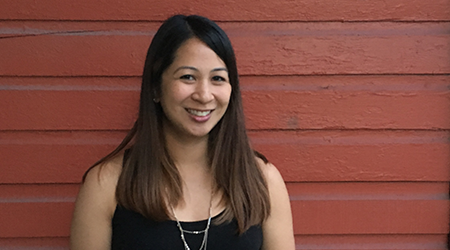Class of 2009
Hometown: Vancouver
 Why did you decide to pursue a career in genetic counselling?
Why did you decide to pursue a career in genetic counselling?
I always envisioned that my ideal career would continue to challenge and stimulate me. I also knew that I wanted to be able to interact with people and was drawn to the counselling and educational aspects of a career in genetic counselling. Through my shadowing of genetic counsellors and volunteer experiences in medical genetics and in crisis/sexual health counselling, I gained a deeper appreciation for how genetic counselling would align with my career goals. I remember having this ‘I love this moment’ as a volunteer when I was observing a genetic counselling session and I so appreciated the reflective discussions I would have afterwards with the genetic counsellors.
How did you hear about genetic counselling?
During my undergraduate studies at Simon Fraser University (SFU) my human genetics professor introduced us to genetic counselling in one of our lectures. Subsequently, in my biotechnology course I was fortunate to have a genetic counsellor give a guest lecture on predictive testing.
What attracted you to UBC’s two-year Genetic Counselling Program?
I was drawn to UBC because of its focus on ensuring students gain a strong foundation in medical genetics through coursework and a breadth of experience in the clinical rotations. I also appreciated that UBC was supportive of students choosing to do summer rotations outside of BC and Canada to broaden their clinical experiences.
How did you prepare for the application process and interviews?
Speaking to genetic counselling students, genetic counsellors, and the program director gave me greater insight into the career and what types of experiences could prepare me for starting training in genetic counselling and ultimately help enrich my future practice as a genetic counsellor. Excited and conscientious about preparing for the interviews, I participated in an interview training workshop at SFU.
What’s one piece of advice you would offer to prospective applicants interested in joining UBC’s program?
Acceptance into a genetic counselling training program is highly competitive and the training is a demanding experience and commitment. Make an effort to connect with the past and current students, program director(s), and the graduate advisor to get a better sense of each training program you are applying to so you may thoughtfully reflect on whether UBC’s training program is the right fit for you.
Looking back, what was the biggest highlight from your time in the program?
In reflecting on my training, the clinical rotations and specialty rotations were a strength of the program and definitely a highlight of my time during my training. The opportunity to connect with the patients and increasingly feel confident in my skills in genetic counselling and ability to make a meaningful impact was rewarding and kept me persevering in an intense clinical graduate program.
What are you doing now?
I am a senior research genetic counsellor and clinical assistant professor in the UBC Department of Psychiatry. I am based out at UBC Hospital within the Institute of Mental Health Centre for Care and Research (IMH CCR). I lead my own genetic counselling research as a clinician investigator, which includes the provision of psychiatric genetic counselling (PGC) to patients enrolled in this research focused on building an evidence base for PGC in patient populations for which genetic counselling outcome data is lacking. I am also involved in clinical research coordination for the IMH CCR and collaborate on multiple research studies with my colleagues in the Department of Psychiatry.
How did UBC’s Genetic Counselling Program prepare you for your current role?
UBC’s Genetic Counselling Program helped me build the foundational clinical skills in psychosocial counselling, assessment and effectively communicating risk that I use within my psychiatric genetic counselling sessions. My expertise in medical genetics also allows me to act as a consultant to my colleagues in psychiatry when there are questions about risk assessment, appropriateness of genetic testing and counselling.








